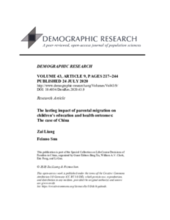Displaying 61 - 70 of 323
The present study aims to explore the associations between grandparenting styles and childhood depression, as well as the mediating role of childhood food insecurity on the focal associations among Chinese rural left-behind children.
This study employed a life-course perspective to reveal the dynamic developmental trajectories and concealed protective factors among college students with left-behind experience.
"Argued as being a way to save innocent lives, Japan’s first ever 'Baby Hatch' was established with nothing but good intentions," says this article from Metropolis. "However, a system that essentially allows parents to renounce their parenthood and anonymously give away their child raises questions of ethics, financial priorities and of what is thought to be the best interests of the child."
The primary objective of this study is to test the effects of family, school and background characteristics on left-behind children’s (LBC) and non-left-behind children’s (NLBC) physical health, school performance, and delinquent behavior.
This chapter compares and contrasts trends in international adoption in China and India over a period of 27 years from 1992 to 2018.
For this study, the authors conducted the first nationwide survey to examine whether left-behind children aged 0–6 years old have poor interactions with primary caregivers, and whether school-age children experience higher levels of victimization and emotional distress than their non-left-behind counterparts.
This study aimed to systematically review experimental studies of interventions that promote mental health wellbeing of left-behind children (LBC) in mainland China.
The current study aimed to clarify the relationship between stressful life events and delinquency among left-behind adolescents by examining the moderating roles of resilience and separation duration in this process.
Informed by the family systems theory and the ecological view of well-being, this study aimed to investigate how grandparent–child dyads show reciprocal associations between relationship quality and subjective well-being (SWB) and the extent to which resilience accounts for such reciprocal associations.
Capitalizing on a unique survey in China, the authors of this article aim to study the lasting educational and health consequences of parental migration on children.

